Asia-Pacific
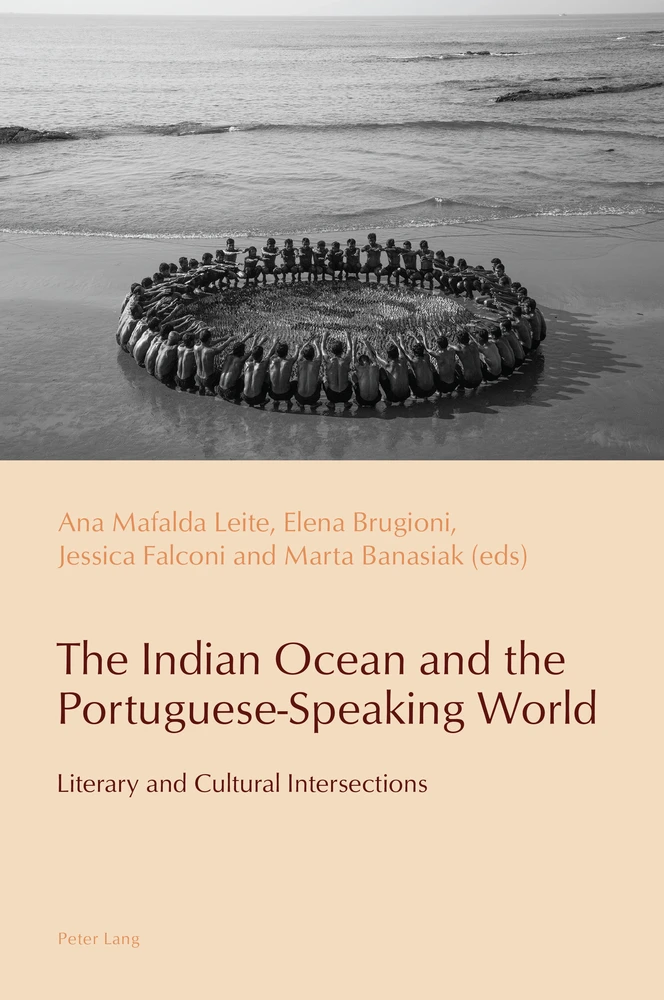
The Indian Ocean and the Portuguese-Speaking World: Literary and Cultural Intersections
Abstract:
Working from the premise that the Indian Ocean shapes new transnational imaginative geographies, this volume analyses how visual and written narratives from Lusophone, or rather «Lusotopic», spaces – Portugal, Mozambique, East Timor and Goa – point to productive critical dialogues with existing theories in Indian Ocean studies. The conceptual and epistemological revision presented in the book allows for the emergence of different theoretical constellations that are not solely based on the opposition between coloniality and the postcolonial condition, nor grounded upon the concept of linguistic or national identity, pointing to a set of original critical developments within the area of Indian Ocean studies.
Cite this book:
Leite, A., M., Brugioni, E., Falconi, J., Banasiak, M. (2025). The Indian Ocean and the Portuguese-Speaking World. Literary and Cultural Intersections. Oxford, United Kingdom: Peter Lang Verlag. Retrieved Dec 13, 2024, from 10.3726/b17729
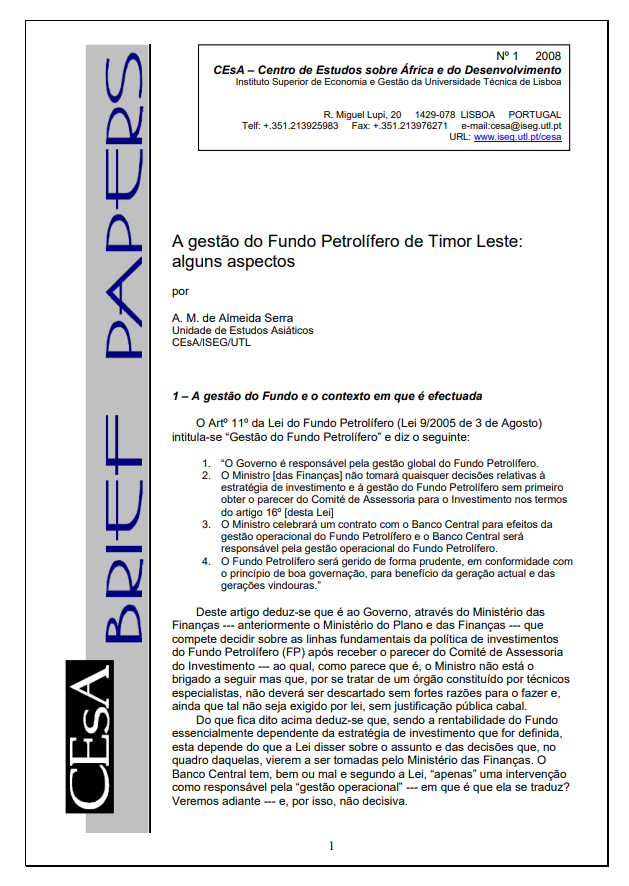
Brief Paper 1/2008: A Gestão do Fundo Petrolífero de Timor Leste: Alguns aspectos
Abstract:
The Article 11 of the Petroleum Fund Law (Law 9/2005 of 3 August) deduces that the Government, through the Ministry of Finance – formerly the Ministry of Planning and Finance – is responsible for deciding on the fundamental lines of the investment policy of the Petroleum Fund (PF) after receiving the opinion of the Investment Advisory Committee – to which, as it appears to be, the Minister is not bound to follow, but since it is a body made up of technical experts, it should not be dismissed without strong reasons to do so, and even if this is not required by law, without full public justification. As indicated by the characteristics of the series of CEsA texts in which it is published – its Brief Papers – A gestão do fundo petrolífero de Timor Leste: alguns aspectos should be understood as corresponding to a (little more than) initial phase of research on the topic we have proposed to study. Therefore, its conclusions – if we can speak of true conclusions or even lessons – are merely provisional and subject to some modification as a result of the continued research we have been doing on the subject. For this reason, and as much or more than in other circumstances, an appeal to the reader to let us know his opinions on what has been written, including possible inaccuracies in the approach to the subject, makes sense.
Quotation:
Serra, António M. de Almeida. 2008. “A gestão do fundo petrolífero de Timor Leste: alguns aspectos”. Instituto Superior de Economia e Gestão – CEsA Brief papers nº 1-2008.
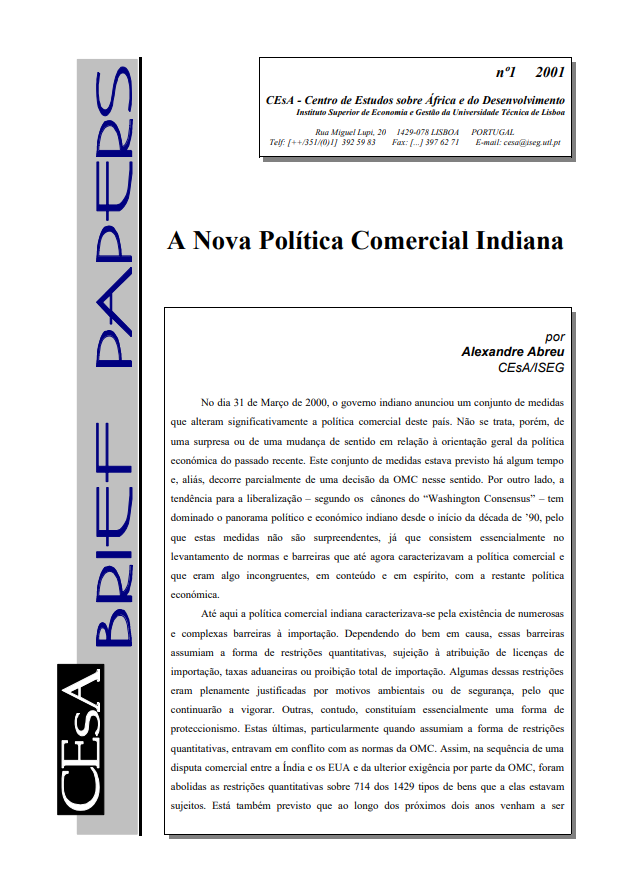
Brief Paper 1/2001: A Nova Política Comercial Indiana
Abstract:
On 31 March 2000, the Indian government announced a set of measures that significantly alter this country’s trade policy, studied in A nova política comercial indiana (The New Indian Trade Policy). This is not, however, a surprise or a change of direction in relation to the general orientation of the economic policy of the recent past. This set of measures was foreseen some time ago and, moreover, partly stems from a WTO decision to that effect. On the other hand, the trend towards liberalisation – along the lines of the “Washington Consensus” – has dominated the Indian economic and political landscape since the early 1990s. Hitherto Indian trade policy was characterised by the existence of numerous and complex import barriers. Depending on the good concerned, these barriers took the form of quantitative restrictions, import licensing, tariffs or a complete ban on imports. Some of these restrictions were fully justified on environmental or safety grounds and will therefore remain in place. Others, however, were essentially a form of protectionism. The latter, particularly when they took the form of quantitative restrictions, conflicted with WTO rules. Thus, following a trade dispute between India and the US and subsequent WTO demand, quantitative restrictions on 714 of the 1429 types of goods that were subject to them were abolished. It is also expected that over the next two years many of the remaining restrictions will be removed or reduced, in particular all quantitative restrictions – with the exception, as already mentioned, of those for environmental or safety reasons – and a substantial part of customs duties.
Quotation:
Abreu, Alexandre. 2001. “A nova política comercial indiana”. Instituto Superior de Economia e Gestão – CEsA Brief papers nº 1-2001.
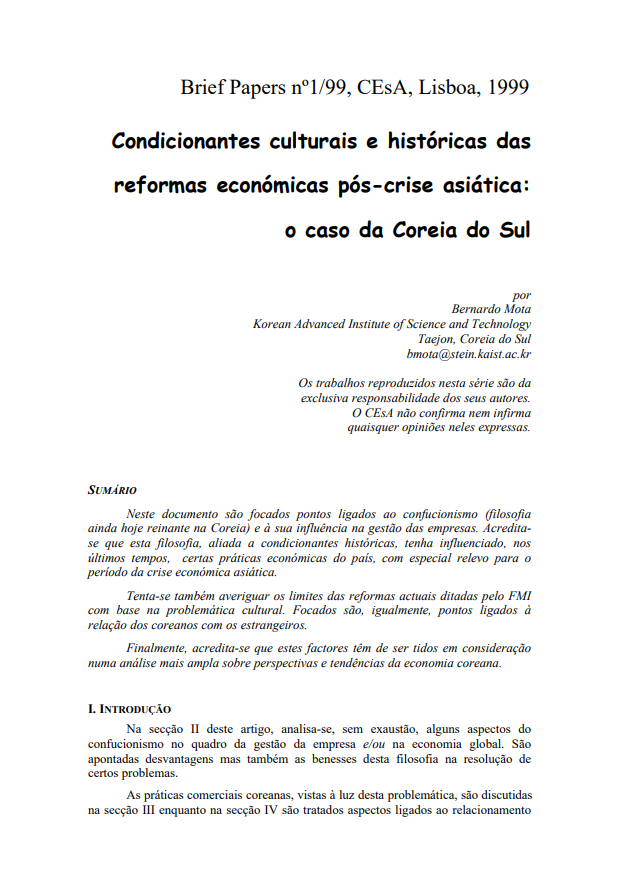
Brief Paper 1/1999: Condicionantes Culturais e Históricas das Reformas Económicas Pós-crise Asiática: O caso da Coreia do Sul
Abstract:
In Condicionantes Culturais e Históricas das Reformas Económicas Pós-crise Asiática: O caso da Coreia do Sul, we focus on Confucianism (a philosophy still prevailing in Korea) and its influence in the management of companies. It is believed that this philosophy, together with historical conditions, has influenced certain economic practices in the country in recent times, with special emphasis on the period of the Asian economic crisis. An attempt is also made to investigate the limits of the current reforms dictated by the IMF on the basis of cultural issues. It also focuses on the relationship between Koreans and foreigners. Finally, it is believed that these factors have to be taken into consideration in a broader analysis of prospects and trends in the Korean economy. It is believed that in an economic or financial analysis of the Korean (and Asian) crisis, its consequences and the outcome of reforms it is indispensable to take into account cultural and historical factors and social specificities. Confucianism is the most influential of these features. Some points of its influence on economic decision-making are reviewed. Certain Confucian features are believed to act as catalysts for economic recovery, and should not be completely dismissed as anachronistic. Korea could become a model of development, combining, in an original way, such divine variables as Confucianism, globalisation and economic liberalisation, on condition that a certain rigour in administration is introduced. Finally, I am convinced that a Confucian society is not incompatible with economic and democratic development in an increasingly global environment.
Quotation:
Mota, Bernardo. 1999. “Condicionantes culturais e históricas das reformas económicas pós-crise asiática : o caso da Coreia do Sul”. Instituto Superior de Economia e Gestão – CEsA Brief papers nº 1-1999
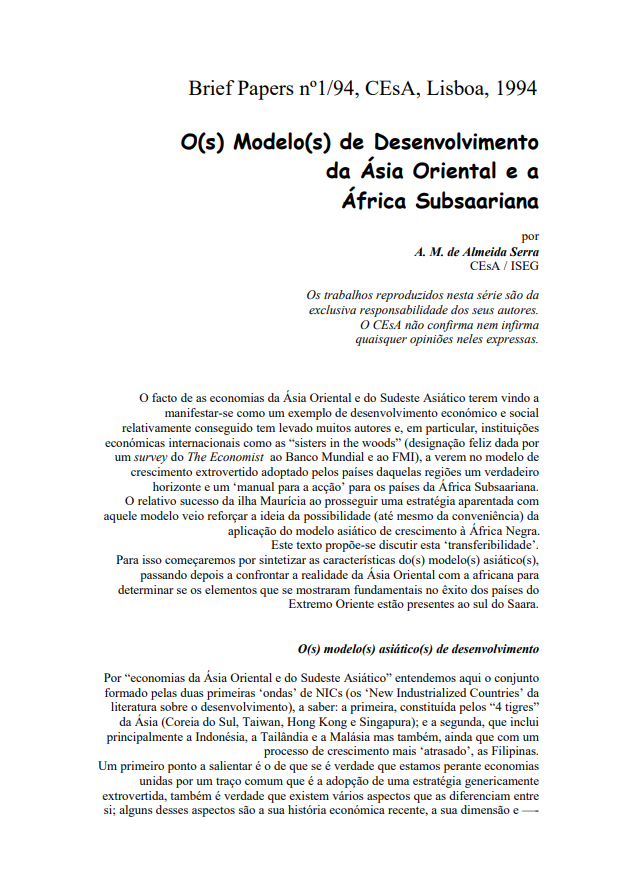
Brief Paper 1/1994: O(s) Modelo(s) de Desenvolvimento da Ásia Oriental e a África Subsaariana
Abstract:
The fact that the economies of East Asia and Southeast Asia have emerged as an example of relatively successful economic and social development has led many authors and, in particular, international economic institutions such as the “sisters in the woods” (the felicitous name given to the World Bank and the IMF by a survey in The Economist), to see the model of extroverted growth adopted by the countries of those regions as a real horizon and “manual for action” for the countries of Sub-Saharan Africa. The relative success of Mauritius in pursuing a strategy similar to this model has reinforced the idea that it is possible (and even desirable) to apply the Asian growth model to Black Africa. O(s) modelo(s) de desenvolvimento da Ásia Oriental e a África Subsaariana aims to discuss this “transferability”. To this end, we shall begin by summarising the characteristics of the Asian model(s), and then move on to confront the East Asian reality with that of Africa in order to determine whether the elements that proved fundamental to the success of the Far Eastern countries are present to the south of the Sahara.
Quotation:
Serra, António M. de Almeida. 1994. “O(s) modelo(s) de desenvolvimento da Ásia Oriental e a África Subsaariana”. Instituto Superior de Economia e Gestão – CEsA Brief papers nº 1-1994.
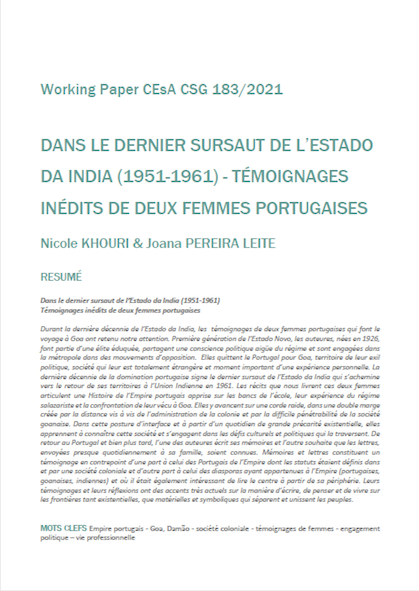
Working Paper 183/2021: Dans le Dernier Sursaut de l’Estado da Índia (1951-1961): Témoignages inédits de deux femmes portugaises
Abstract:
During the last decade of Estado da Índia, the testimonies of two Portuguese women who embark on a trip to Goa have caught our attention, getting us to write Dans le dernier sursaut de l’Estado da Índia (1951-1961) : témoignages inédits de deux femmes portugaises. Born in 1926 and part of the first generation of Estado Novo, the authors belong to an educated elite and share an acute political awareness of the regime, choosing even to engage in the metropolis opposition movements. They left Portugal for Goa, the territory of their political exile, a society totally alien to them and an important moment of personal experience. The last decade of the Portuguese domination sign the last burst of Estado da Índia which is moving towards the return of its territories to the Indian Union in 1961. The stories left by these two women articulate a history of the Portuguese empire, learned on school benches, portraying an experience of the Salazarist regime and the confrontation of the authors’ experience in Goa. There they make their way on a tightrope, created both by the distance to the colonial administration and by the difficult penetrability of Goan society. In this interface and stemming from an everyday of existential precariousness, they get to know this society and engage in the cultural and political challenges that cross it. Back in Portugal and later on, one of the authors write her memories and the other wish for the exposure of the letters, that she daily written to her family . The memoirs and letters constitute a counterpoint testimony, on the one hand to that of the Portuguese of the Empire (whose statuses and belonging were defined in a colonial society) and, on the other, to that of the diasporas belonging to the Empire (Portuguese, Goans , Indians) by where it is also interesting to read the center from its periphery. Their testimonies and their reflections have very current accents on the way of writing, of thinking and living on existential, material, and symbolic borders that both separate and unite people.
Quotation:
Khouri, Nicole e Joana Pereira Leite (2021). “Dans le dernier sursaut de l’Estado da Índia (1951-1961) : témoignages inédits de deux femmes portugaises”. Instituto Superior de Economia e Gestão – CEsA/ CSG –Documentos de Trabalho nº 183/2021.





